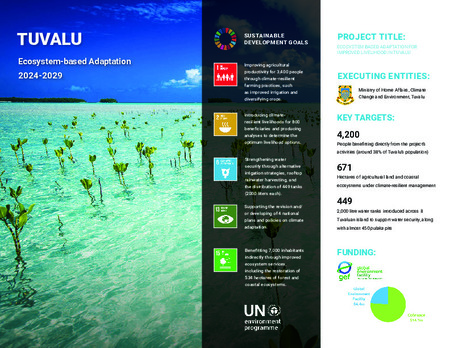| dc.contributor | Climate Change Division | en_US |
| dc.contributor.author | United Nations Environment Programme | en_US |
| dc.coverage.spatial | Tuvalu | en_US |
| dc.date.accessioned | 2024-07-09T15:47:47Z | |
| dc.date.available | 2024-07-09T15:47:47Z | |
| dc.date.issued | 2024-07 | |
| dc.identifier.uri | https://wedocs.unep.org/20.500.11822/45899 | |
| dc.description | Like many Pacific islands, Tuvalu is considered
one of the most vulnerable countries to climate
change because the country’s nine islands are
small low-lying atolls, with an average height of
1 meter-above-sea level.
Natural ecosystems in Tuvalu – including
mangroves, coastal forest and coral reefs –
provide key defenses for communities against
the impacts of sea level rise and storms.
A project is aiming to increase the climate
resilience of communities in Tuvalu through
ecosystem-based adaptation (EbA), an
approach of using nature and ecosystems as
part of an overall adaptation strategy.
In addition to restoring damaged ecosystems,
the project is building climate resilience
through climate-resilient agricultural practices;
supporting alternative, diversified livelihoods;
and mainstreaming EbA into policies and
planning through capacity building. | en_US |
| dc.description.uri | https://www.unep.org/explore-topics/climate-action/what-we-do/climate-adaptation | en_US |
| dc.format | pdf | en_US |
| dc.language | English | en_US |
| dc.rights | Public | en_US |
| dc.subject | climate change | en_US |
| dc.subject | climate change adaptation | en_US |
| dc.title | Tuvalu: Ecosystem-based Adaptation 2024-2029 | en_US |
| dc.type | Factsheets, Infographics and Brochures | en_US |
| wd.identifier.sdg | SDG 13 - Climate Action | en_US |
| wd.topics | Climate Action | en_US |
| wd.identifier.pagesnumber | 2 p. | en_US |


